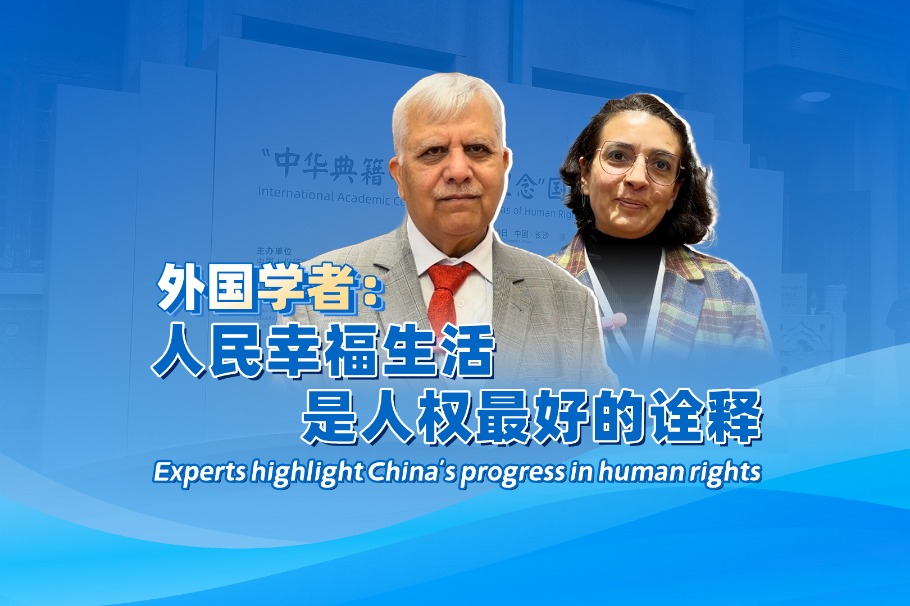Sino-US mutual understanding key to world peace
By Wilson Lee Flores | China Daily Global | Updated: 2024-04-23 09:16
As United States Secretary of State Antony Blinken prepares to visit China again from Wednesday to Friday, the Biden administration finds itself at a crucial crossroads in defining the future of Sino-US relations. Across Asia, there's a palpable sense of urgency, a collective belief that the time has come for the US to grasp this moment and forge a new era of collaboration and mutual understanding with China, a move critical for global stability and peace.
In order to foster a sense of normalcy and stability in bilateral relations, it is crucial for leaders from both the Democratic and Republican parties in the US to dispel the unfounded and irrational perception of China as an existential foe akin to the former USSR during the Cold War era. Great intellectuals like American economist Jeffrey Sachs, Singaporean statesmen such as late Lee Kuan Yew, Kishore Mahbubani and George Yeo have unequivocally emphasized that China's economic resurgence poses no national security threat to the US.
Unlike other big powers in the past, China has no history as a militaristic colonizer but has, in fact, been a victim of many colonial invasions such as in the Opium Wars era. It has no foreign military bases in Mexico or Canada, it has no battleships or warplanes patrolling the seas near US territories such as California, Florida, New York or Hawaii. Let us also not forget that China and the US were strong allies during World War I and World War II.
Contrary to alarmist, unjustified anxieties and jingoistic rhetoric by some in the West, China's historical track record is one steeped in millenniums of cultural richness and philosophical enlightenment. It was not a colonizing power, even when its fleet of massive treasure ships and 30,000 sailors led by Admiral Zheng He of the Ming Dynasty toured different continents in seven epic voyages. From the profound humanist teachings of philosopher Confucius, tea culture, Taoism, the pacifist self-defense focus of Chinese martial arts to the artistic splendor of its poetry and exquisite cuisines, China has epitomized a civilization dedicated to peaceful self-development and societal harmony.
Unlike other countries which became big powers partly due to colonial military conquests, the peaceful rise of China was built on the Chinese people's almost infinite capacity for hard work, entrepreneurial vigor, creativity, innovations and the enlightened policies of its pragmatic leaders. In only a couple of decades of market-oriented reforms and social peace starting in 1978, China had liberated over 800 million people from poverty on a scale unparalleled in human history. The fallacy of viewing China through a lens of hostility and age-old racial prejudice by some in the West only serves to undermine constructive dialogue and exacerbate tensions. Instead of reacting to it with fear and envy, this noble nation deserves our respect, admiration and partnership.
Indeed, the peaceful rise of China has been a driving force behind global economic growth and technological advancement. To unfairly perceive its ascent as a zero-sum game is to overlook the interconnectedness of our globalized world and the immeasurable shared benefits of win-win cooperation.
In advocating for a shift away from adversarial posturing and unjustified trepidations, it is imperative for the US to recognize the mutual interests and rationality that underpin Sino-US relations. Rather than resorting to counterproductive, disruptive punitive measures such as trade sanctions and technological embargoes, a collaborative approach holds the key to addressing pressing global challenges. From combating the crisis of climate change to countering transnational threats such as terrorism and cybercrime, from wars, poverty to public health issues, the convergence of Chinese and US capabilities offers the world a potent means of collective action.
Fostering strategic cooperation between the two nations is essential to stabilize the world's increasingly complex geopolitical environment. By transcending narrow-minded, xenophobic nationalism and embracing a spirit of partnership, the US and China can serve as linchpins of stability and rationality in an uncertain world. It is only through dialogue, compromise and mutual respect that the aspirations of global peace and progress can be realized.
In conclusion, the forthcoming visit of Blinken to China presents another opportunity for the US to help chart a course toward constructive engagement and collaboration. Significant progress in bilateral China-US relations can only happen if the two countries can show sincerity in both actions and words. By shedding the shackles of outdated and antagonistic Cold War mindset and embracing a vision of shared prosperity, both nations stand to reap the dividends of a more interconnected and harmonious world order.
The author is moderator of the Pandesal Forum, a multi-award winning writer, columnist of "Philippine Star" and "Abante "newspapers, economics and politics analyst, poet, college teacher and real estate entrepreneur. The views do not necessarily reflect those of China Daily.
























